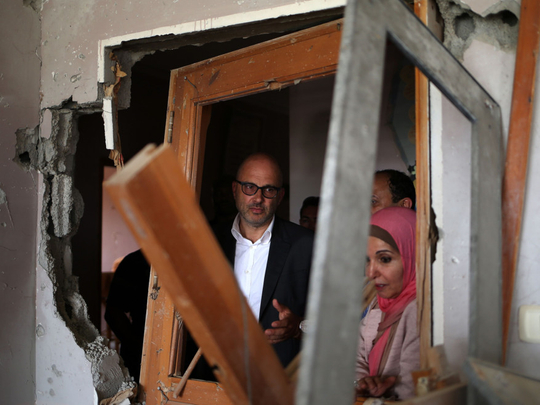
Occupied Jerusalem: A top UN official helping oversee Gaza’s reconstruction following its 2014 war with the Israeli regime says the territory is on a “disastrous trajectory,” with Israel’s blockade and Palestinian divisions hampering recovery.
Robert Piper, UN deputy special coordinator for the Middle East peace process as well as humanitarian coordinator for the Palestinian territories, spoke to AFP after returning from one of his regular visits to the impoverished Gaza Strip.
His latest visit came at a time of growing concern over a possible new conflict in Gaza after three brutal assaults by Israeli forces since 2008. More than a year after the last war in 2014, around 100,000 people remain displaced. Of the 11,000 homes completely destroyed, only 859 have been rebuilt.
Delays in reconstruction have been blamed on Israel’s blockade of Gaza along with shortages in donor funding.
A lack of coordination between Hamas, the Islamist movement that rules the Gaza Strip, and the West Bank-based Palestinian Authority, dominated by rival Fatah, have also contributed to the slow pace.
AFP: What were some of your impressions from your visit?
Piper: “Progress is continuing on the recovery process, but there’s no changes to the underlying fragility of Gaza. It remains on a frankly disastrous trajectory of de-development and radicalisation as far as I can tell... The blockade remains firmly in place and we are trying to work within the constraints of the blockade to get materials in and help, and I can report progress on that... But it remains a blockade. It remains an economy that is completely artificially blocked from the market... It’s a blockade that prevents students from getting to universities to further their studies in other places. It’s a blockade that prevents sick people from getting the health care that they need, even if there are every day a few ambulances coming through.”
What is to blame for the slow reconstruction?
“I think the honest answer is everyone shares some of the responsibility, but without question the biggest obstacle to a rapid reconstruction process is the blockade...
“But let me just push back a bit on your presumption, which is that the reconstruction process is going desperately slowly, and I really don’t accept that as necessarily true. Tough though the conditions are... over 70,000 people have accessed materials and repaired their houses... Another 15,000 or so have got it underway. Almost all of the health facilities have now been repaired or reconstructed. Almost all of the schools that were damaged have now been repaired or reconstructed. Almost all of the damage to the water and electricity network by the 2014 hostilities has now been repaired.
“The biggest gap in repairs - in restoring Gaza to its June 2014 status - is in the reconstruction of houses, the ones that are totally destroyed as opposed to the ones needing repair work.”












